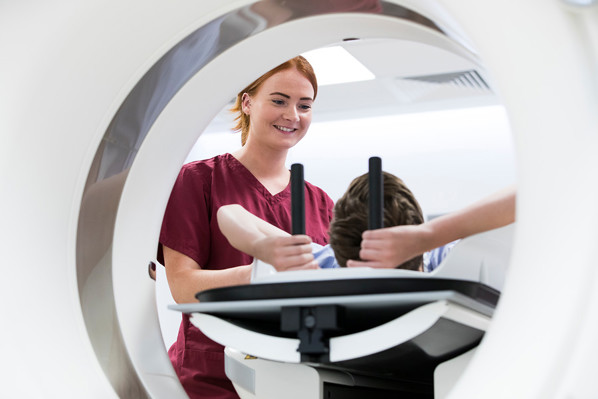Bladder carbogen and nicotinamide (BCON), combined with radiotherapy, is an innovative treatment regimen. It is designed to maximise the effectiveness of conventional radiotherapy treatment.
If a bladder tumour outgrows its blood supply, parts of it can become deoxygenated. This is called hypoxia. Hypoxic tumours can be more resistant to radiotherapy, so they can be harder to treat.
BCON involves nicotinamide vitamin tablets taken before radiotherapy alongside high dose oxygen (carbogen), breathed continuously throughout the treatment. Combined, these supply the cancerous cells with oxygen and make them more sensitive to radiotherapy. BCON treatment is usually well-tolerated and offers an alternative for patients where chemotherapy may be considered too aggressive.

Information for bladder cancer patients receiving carbogen and nicotinamide
This information is for patients with bladder cancer and is about a treatment patients have as part of their bladder cancer treatment.
We know from experience that in some bladder cancer patients, radiotherapy alone does not completely remove the cancer. Cancer cells which have low levels of oxygen are less sensitive to radiation than those with normal or high levels of oxygen.
As a result, our current standard radiotherapy treatment involves measures that help to increase the levels of oxygen in the tumour. This treatment is made up of 2 components: carbogen and nicotinamide tablets.
Carbogen
Carbogen is a gas made up of 98% oxygen and 2% carbon dioxide which is given through a breathing mask while patients are lying on the radiotherapy couch receiving treatment. Patients who feel uncomfortable wearing a mask can receive the gas through a mouthpiece.
The mixture of gases (carbogen) is usually managed well with few recognised side effects. Other than the mild discomfort of wearing a mask, some patients feel a little short of breath which lasts for a few minutes. With practice and experience, most patients overcome this and no longer notice any side effects after a few treatments.
Nicotinamide tablets (also known as Niacinamide or nicotinic acid)
Nicotinamide is a vitamin which helps increase blood flow in the tumour. The tablets will need to be taken 1½ to 2 hours before the radiotherapy treatment.
Nicotinamide has a few side effects associated with it. The most common side effect is nausea and less commonly loose bowels, headaches, dizziness and flushing. These effects may be reduced by taking the tablets with food.
If you suffer from any of these side effects, please let us know, we may suggest either reducing the dose or stopping the tablets. However, if you have no problems, you will be asked to take the tablets before each radiotherapy treatment.
You will be given some anti-sickness medication on day 1 of your treatment which you can take if you feel nauseous. The tablets only need to be taken on days when you receive treatment – usually this is Mondays to Fridays and not at weekends.
Both nicotinamide and carbogen have been used widely across the world during the development of this form of treatment.
The main side effects of having radiotherapy to the bladder are discomfort in your bowels, loosening of bowel motions, an increased frequency and urgency of urination, stinging while passing urine and fatigue. You will be asked to empty your bladder before treatment each day.
During your treatment, you will have a review weekly by your clinical team (doctor, specialist radiographer or nurse clinician) to assess for any side effects of the treatment. This may be face-to-face or via telephone.
The radiographers on the treatment machines will also perform routine checks daily and ask about any issues you may have and ensure you are managing to take the tablets every day. You will have your bloods checked weekly while taking nicotinamide.
For more information about the radiotherapy treatment, please refer to the 'Radiotherapy to the bladder' booklet which should be given to you prior to consenting to the treatment. You can also obtain a copy at one of the cancer information centres at The Christie in Withington, Oldham, Macclesfield or Salford.
You can also contact your team on the following numbers:
- Urology advanced practitioner radiographer - 0161 918 2096 or contact your urology clinical nurse specialist
- Review team at The Christie at Oldham - 0161 918 7700
- Review team at The Christie at Macclesfield - 0161 956 1700
- Review team at The Christie at Salford - 0161 918 7800
- For queries about symptoms or side effects out of hours, call The Christie Hotline - 0161 446 3658 (24 hours a day, 7 days a week)
